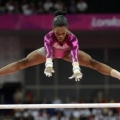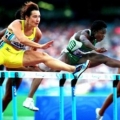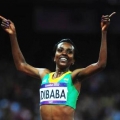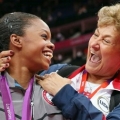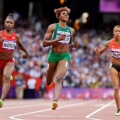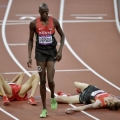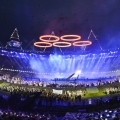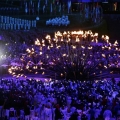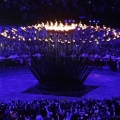London will become the first city to officially host the Olympic Games three times. The $14 billion games will hold between the 27th of July and 12th of August. The opening ceremony is expected to be viewed by a billion people worldwide. Some 15,000 square meters of staging and 12,956 props will be used, and the event will boast a million-watt PA system using more than 500 speakers.
The crowd of about 80,000 will include the Queen and a host of dignitaries and celebrities.
The Queen and Prince Philip will host a Buckingham Palace reception for heads of state and government and an opening ceremony celebration concert featuring Snow Patrol, Stereophonics, Duran Duran and Paolo Nutini will be held in Hyde Park.
More than 10,000 athletes from 204 nations will take part in the London Olympics.
History of the Olympics
According to legend, the ancient Olympic Games were founded by Heracles (the Roman Hercules), a son of Zeus. Yet the first Olympic Games for which we still have written records were held in 776 BCE (though it is generally believed that the Games had been going on for many years already). At this Olympic Games, a naked runner, Coroebus (a cook from Elis), won the sole event at the Olympics, the stade – a run of approximately 192 meters (210 yards). This made Coroebus the very first Olympic champion in history.
The ancient Olympic Games grew and continued to be played every four years for nearly 1200 years. In 393 CE, the Roman emperor Theodosius I, a Christian, abolished the Games because of their pagan influences.
Approximately 1500 years later, a young Frenchmen named Pierre de Coubertin began their revival. Coubertin is now known as le Rénovateur. Coubertin was a French aristocrat born on January 1, 1863. He was only seven years old when France was overrun by the Germans during the Franco-Prussian War of 1870. Some believe that Coubertin attributed the defeat of France not to its military skills but rather to the French soldiers’ lack of vigor.* After examining the education of the German, British, and American children, Coubertin decided that it was exercise, more specifically sports, that made a well-rounded and vigorous person.
Coubertin’s attempt to get France interested in sports was not met with enthusiasm. Still, Coubertin persisted. In 1890, he organized and founded a sports organization, Union des Sociétés Francaises de Sports Athlétiques (USFSA). Two years later, Coubertin first pitched his idea to revive the Olympic Games. At a meeting of the Union des Sports Athlétiques in Paris on November 25, 1892, Coubertin stated,
Let us export our oarsmen, our runners, our fencers into other lands. That is the true Free Trade of the future; and the day it is introduced into Europe the cause of Peace will have received a new and strong ally. It inspires me to touch upon another step I now propose and in it I shall ask that the help you have given me hitherto you will extend again, so that together we may attempt to realise [sic], upon a basis suitable to the conditions of our modern life, the splendid and beneficent task of reviving the Olympic Games.**
His speech did not inspire action. Though Coubertin was not the first to propose the revival of the Olympic Games, he was certainly the most well-connected and persistent of those to do so. Two years later, Coubertin organized a meeting with 79 delegates who represented nine countries. He gathered these delegates in an auditorium that was decorated by neoclassical murals and similar additional points of ambiance. At this meeting, Coubertin eloquently spoke of the revival of the Olympic Games. This time, Coubertin aroused interest.
The delegates at the conference voted unanimously for the Olympic Games. The delegates also decided to have Coubertin construct an international committee to organize the Games. This committee became the International Olympic Committee (IOC; Comité Internationale Olympique) and Demetrious Vikelas from Greece was selected to be its first president. Athens was chosen as the location for the revival of the Olympic Games and the planning was begun.
The Olympics begun in 1896 and has endured through some tough times. The five Olympic rings symbolize power with each ring representing five continents.




